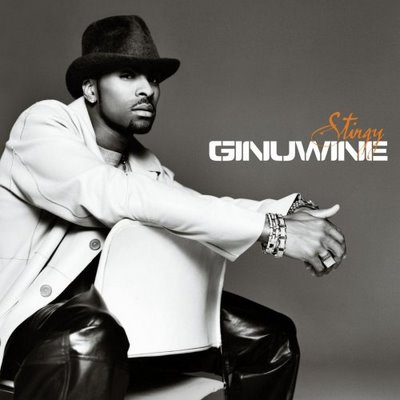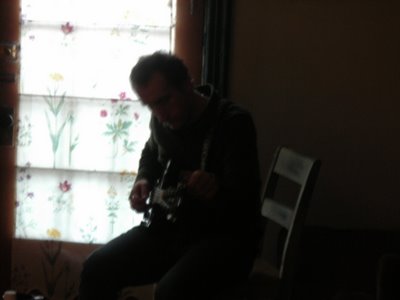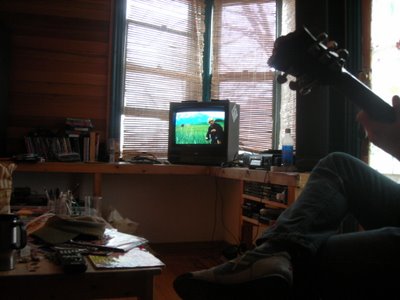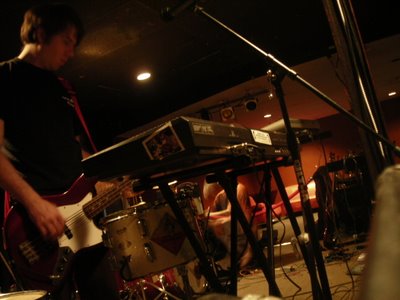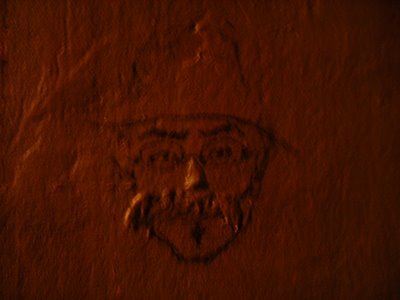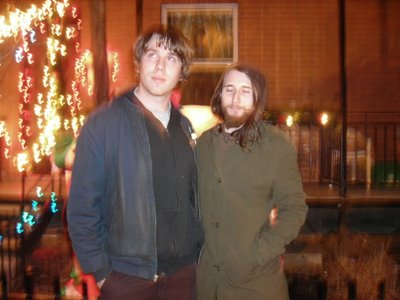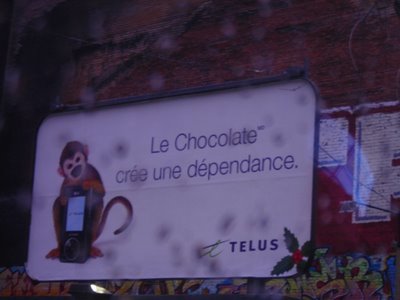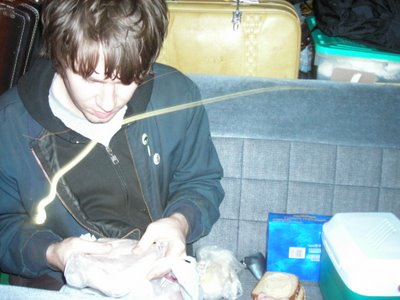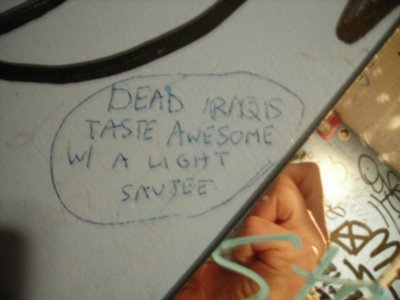Passing the time here and there, indulgentastic meanderings on the Music that Mattered to Me last year.
1. Pet Shop Boys
Having only half-remembered a handful of their biggest hits, I was oh so um pleasantly surprised to find entire PSB albums that were worth my time. The chronology goes like this: Please, Actually, Introspective, Behavior. Them's the ones worth exploring – I simply can not vouch for the later catalogue (I like Very, but less defensibly).
[Regarding Popism. Remember when everyone tried to find out about un- or less-discovered music in order to either enjoy themselves or gain subcultural cred? I mean, that's how I remember the mid-90's (ed. revisionism suspected). Or that's what I got from reading Magnet and Alternative Press. Well, the new thing is discovering worth instead in the music of the mainstream populace. And maybe not just because it's so unlikely that there's any music left to discover (thank you, Internet). But, still less than ideal, maybe partly because there's something somehow subversive to be said for Google Earth zooming out and applying our college-educated intellection to music that's actually meant something to the masses. Pop anthropology aside, I also mean to touch briefly upon the Death of Guilty Pleasures: seems to me there's very little room left for shameful enjoyment when there'll always be something valuable to glean from everything. Exaggeration, but maybe just, like, art-historical vectors of analysis or something. Anyway, this whole Popism thing I think is maybe one potentially positive direction the kids these days could take. I can't tell how rampant or effective it is, but I know a couple of my recent favorites are significantly above-ground finds.]
Anyway, the Pet Shop Boys. The drum machines and synthesizer sounds, sometimes they sound like presets, and sometimes they are, but the overall production value is absolutely crystal clear definition. This goes double for the vocals -- Tennant slices through the mix with precision. And lyrically, it's babble-less economics. It's like they came from disco, but also from The Kinks (or something else as smart and socially conscious; if I may, I'm reminded of Pulp and Blur but with less knowingness. Sorry.). Please and Actually are the most recommendable b/c they're short and to the point (and contain those humongous hits); Introspective leans closer to house/techno long-form than pop mechanics, and Behavior vice versa. If only Madonna's albums measured up (excepting True Blue).
Like some other things I've fixated on this year, this is slick 80's pop. There's nothing raw or messy about it. Perfect architecture in sound and song structure, at least most of the time. Gloss, and not just for it's own sake. But still, don't take that sheen for granted either, it's an essential foundation of the imaginary environment. And with regard to reverb, there was once a time when the defaults were set to Wet... Why have things dried up so, since the 80's? Is it maybe somehow due to digital recording? That would be pretty pretty pretty pretty ironic.
(Thanks to the estate of Viva Cohen.)
2. Scott Walker
I started with Tilt last year, which came out nearly 10 years ago. That voice was ridiculous, opera-like, almost somehow even not melodic, just going on and on, with the vibrato and the relentless melodramatic intensity. The music is avant-rock, with epic orchestral embellishments, and still somehow truly foreign sounds (it can be done), and the production actually reminds me of ...Nothing Like the Sun (I'm just arriving at this now, but oh wow, what Sting could do, what so many elder icons could do, if they wanted to...). Tilt, I don't know what these songs are about, but after listening to it tons I find the melody and retain it, and can anticipate the dramatic dynamic shifts, and can enjoy the voice -- it's not all dumbed-down opera parody, none of it is, but I don't know what it is, it's not teasing or ironic (the sound), it's pained and serious, always serious and poetic and seriously poetic. I wonder when people criticize that so-and-so take themselves too seriously, what is that? The non-serious ideal? Not that anyone's saying that about Walker.
Turns out the new album, The Drift, is even more strange, dark, and dissonant. And though it might seem even more difficult to read or decode than Tilt, I think it's much more immediate and instantly gripping. It's visceral and noisy and crushing and tactily dense. Not all the time, there's still some lean 'mathy' moments, and some ultra-pregnant pauses. Well, not really though -- b/c the quiet times are always eerie, but the dynamic shifts are so well-timed that they genuinely shock, stir....make you rush back to the volume knob.
Of course it's exactly this type of musical description that prompts one-upmanship, but the sonic shock value is only a part. What're these lyrics about? From interviews, I understand "Jesse" to be about 9/11, but only via imagining Elvis's graveside conversation with his unborn twin brother; that and prairy vs. skyscrapered landscapes as tools for unpacking a disillusioned American Dream. That's just part of one song. The Drift reminds me of David Lynch. And not just because it comes close to Mulholland Drive's sound design (that turd-dude behind the diner's dumpster). This stuff about America, coming from a weird perspective -- Walker's USA but has lived in the UK for decades. But also the mining for dream logic, or, at least, unfamiliar reference points. Me, I have to start from zero when I think about the sound of this stuff; or want to.
3. Joanna Newsom
Song Cycle sounds like a musical that's been edited a la musique concrete (to me), and so I anticipated some narrative complexity from Ys , given the songs' lengths. Song Cycle is rendered with studio magic (edits and splices, reverb and echo) but also some of that 'american' or 'jazz-influenced' orchestral scoring, and Parks' voice is small but realer for its limits. Ys was all written by Newsom on harp and voice, and then the orchestra was added after the fact. Her voice and melody and vocabulary and vision overall seem limitless. And it's partly just the ambition and expansiveness that're remarkable here. Who besides Scott Walker and Joanna Newsom are even trying to do so much with the temporal medium? I mean, anyway... makes you want some sweeping ideas and plotlines of your own.
Parks's score runs the gamut: crazy referential, t rex blues violins, surprisingly propulsive, brings dimension(s). But so does Newsom's voice: every single each and every word and note is individually tempered. Re peculiarity, it's like if Bjork had more than just the one trick; Newsom literally sounds like different people sometimes -- maybe too exaggerated there... The songs are stories and maybe different narrators, it's all kind of literary, but I hope that doesn't turn someone off the way certain 'bookish' Indie rockers of late seem to just embarass everything. The next album should be on Deutsche Grammaphone. Or Nonesuch. Or the one Kate Bush was on.
4. Genesis
Excepting his cover of Lauper's "True Colors," my Phil Collins greatest hits CD is pretty much an unfaltering display of affirmative, anthemic hits and the economic production values that only a drummer's drummer's drummer could will upon us. "And yet...?" What about all his other songs I hear on the radio; were they deemed less-great or were they simply less popular? The answer, an answer, is Genesis. Not his songs, but those of a group, a collaborative songwriting unit. Dudes that can effin' play and sound-design, but also know mechanics, dynamics, ir/resolution management, how to compose great pop songs .
They didn't start off that way (nor did they try), but they didn't categorically stay that way either (e.g. "Domino" or even the unedited "Tonight tonight tonight," both from Invisible Touch). Besides the fact that many of their songs are hardwired into my pop radio nostalgia, I also have real respect for Genesis's career. Mostly that they didn't stick to one pursuit. Not that I'm steeped in their lore. But I like to think that, following Peter Gabriel's departure, the group found a way toward polished pop which had nothing to do with artistic compromise. Not like "Gee, we'd sure prefer to compose ever more elaborate epic concept-suites, but there's not enough money in it." More like "Maybe it'd be interesting to adapt our skills and interests to the more immediately gratifying pleasures of pop." Stretches upon speculations, no place near veracity, granted.
[In a way, once again, regarding Popism. This is all kidding aside. Patrick Bateman's caricatured mock-erudite appraisal, while intentionally and successfully funny, also wasn't completely wrongheaded. This music is affirmative and 'powerful,' and knowingly so. But I'd rather disassociate Genesis from any sort of cutesy U.S. Psycho-related 80's revisionistic ironization. Because it needn't ever be a guilty pleasure to begin with. In as much as we're discussing pop music, subtlety and sophistication aren't always ideal. It takes all kinds... But sometimes the underground, the alternative, the punk, the subculturally authentic -- sometimes the art is shyness: the layered-ness ultimately distracting, intentionally or not. Furthermore, sometimes the level of musical sophistication overstates what one could possibly hope to express: having learned the tricks and tools of the trade, you're obligated to make use and explore even further, but the impetus is still one of a few fundamentally common human conditions. "Oh, but the lyrics and musical dramatics are so cheesy!" That cheese's truth-value is often quite ample.]
So anyway, Genesis's Platinum Collection, which came out a couple years ago, is a 3 disc reverse-chronological greatest hits collection. Here I found most of what's missing from my Phil Collins collection. But I also found songs I'd forgotten ever hearing, and more importantly, enough great songs from the same albums that I will now need to pick them up ( The Lamb Lies Down on Broadway, Abacab, Duke, Invisible Touch, possibly We Can't Dance).
Inasmuch as these surveys are meant to encapsulate particular types or genres of interest, I really could've spent this portion on Sting and The Police. B/c I was well familiar with Sting's early albums, but only this year got to know The Police's entire albums. And there may've actually been some thematic similarities between Sting / The Police and Phil Collins (and Peter Gabriel) / Genesis. G.E. Smith, our commercial breaks need you now more than ever!
5. Thom Yorke
Cher Journal Intime,
La Dissidence Moins Qu'exceptionnelle. Radiohead's a group I'm perpetually suspecting isn't cool. Because they're so popular. That no matter how much they experiment, the sounds and songs themselves can't gain on the group's unhip international celebrity -- part of the U2 and REM "alternative" pantheon. That they're uncool to the extent that they try (or pretend) to be experimental or sonically contemporary at least. That there's some offense being taken at their meddling in the cooler genres of music (concrete/electronic, free/jazz, their politics too, I suppose). But no, nothing's really in dispute. RH isn't uncool, they're just not interesting enough. There's nothing to defend or speak up for. I know someone that's complained Yorke's vocals are too droney, don't spread out enough melodically, and that's kind of true. His lyrics aren't as bad as Trent Reznor's, but he does seem to have only a couple of feelings to repeat endlessly with little variation.
La Suffisance Non-très-exceptionnelle. All of which goes for Thom Yorke's The Eraser, which really is a more electronic and less densely arranged Radiohead album. I expected or hoped that it'd be material too experimental (or different) for him to develop with the group, maybe even an all-instrumental electronic affair. It is almost completely electronic (laptop glitchy, to be more specific), but his vocals are very acoustic and very up-front -- both things that RH's been shying away from since Kid A. It turns out to be far more simple songwriting, despite the elaborate textures and unnaturally precise glitch-rhythms. In fact it often sounds like he spent months on the music and then quickly laid down the vocals in a couple days. There's little vocal harmony, and few words -- somehow it sounds a lot more intuitive and less over-wrought than RH. Above all else, it's more calm. Realizing that what I like about RH and TY is probably just the sound (the voice, chord progressions and melodies and harmonies, the engineering and production), not the meaning or content. The Eraser is wallpaper because it's familiar, and its familiarity is due to its suitability. And its suitability must signify something -- and something overarching considering the massive popularity. Again, getting close to sentimentality = truth. Maybe it's just UK emo.






